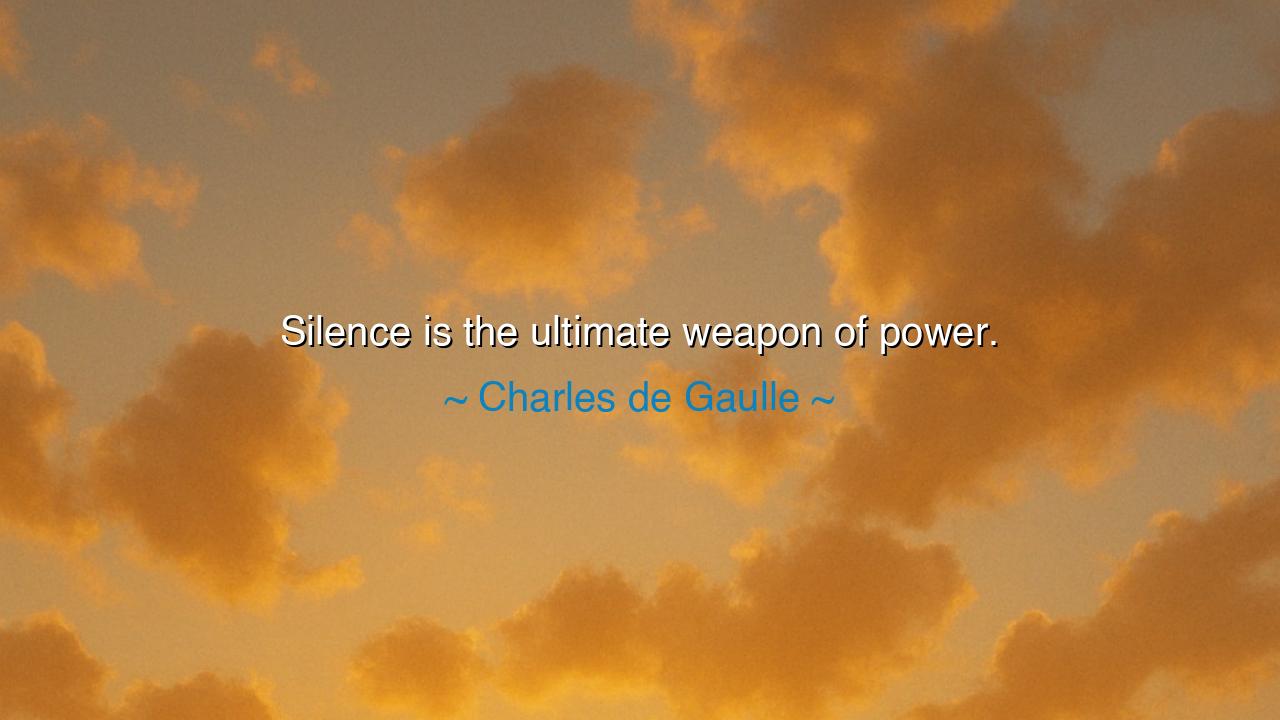
Silence is the ultimate weapon of power.






"Silence is the ultimate weapon of power." Thus spoke Charles de Gaulle, the soldier-statesman who steered France through her darkest hours. These words reveal a secret that few understand: that true strength does not always roar, nor does it always strike with noise and fury. Sometimes the mightiest weapon is the absence of sound, the stillness that unsettles enemies, disarms rivals, and magnifies authority. In silence, the spirit gathers force, and in restraint, it commands greater awe than any shout of thunder.
The ancients recognized this mystery. In the councils of kings, the ruler who listened more than he spoke seemed as one who drank wisdom from the air itself. The general who held his tongue before battle inspired more fear than the one who shouted commands, for silence veils intent, and the unknown is often more terrible than what is revealed. To remain silent is to cloak one’s purpose, to wield patience as a blade sharper than steel.
Consider de Gaulle himself during the Second World War. When France had fallen and many despaired, he did not waste his voice in endless speeches to those who would not hear. Instead, with measured silence, he chose carefully the moments to speak, and when he spoke, his words carried the weight of nations. A single broadcast from London—brief, resolute, unwavering—became a beacon for the French Resistance. His silence before, and his rare words after, transformed his voice into a weapon that rallied a broken people.
This is the paradox of power: he who speaks without pause soon loses the strength of his voice, but he who withholds it makes every word a thunderclap. Silence is a fortress none can storm; it denies the enemy weapons to strike with, for what cannot be read cannot be broken. It compels others to fill the void, revealing their weakness, while the silent one remains unassailable.
Let this teaching be passed down: guard your tongue, for silence can be mightier than argument, mightier than rage, mightier than armies. Speak when the time has ripened, and your words will burn like fire. But until then, wield silence, the invisible weapon, and you will find that in stillness lies the throne of power.






PTP.Thuong Phan Thi
I’ve always been intrigued by the idea that silence can be a weapon, but I wonder if it’s the most effective tool in all situations. While silence can definitely be powerful in negotiations or conflicts, does it always convey control, or could it sometimes be interpreted as fear or weakness? How do we use silence strategically, without coming across as passive or disengaged? Is it possible to wield silence without losing your connection with others?
TNThanh Nguyen
This quote really got me thinking about how silence is often used as a form of control, especially in politics or leadership. When leaders or authorities withhold information or choose not to speak, it can create uncertainty, fear, or even respect. But can silence also create division or resentment if people feel excluded from crucial conversations? How do we draw the line between using silence to maintain power and inadvertently losing trust?
TTNguyen Tuan Tu
When I read this, I couldn’t help but think about how silence can sometimes be more impactful than any words or actions. It makes me question how often we feel the need to fill silence with words. But does silence always equate to power, or can it also be a form of avoidance? How much does context matter in understanding whether silence is a strategic choice or simply a response to discomfort?
DTThen Thi Dieu Thao
De Gaulle’s quote challenges the conventional notion that power is always about loudness or force. Silence, though, can create space for contemplation or send a message without uttering a word. But is silence always effective? What happens when silence is misunderstood, and people interpret it as weakness or lack of engagement? I’m curious if silence is truly powerful in all contexts, or if its strength depends on the situation and how others perceive it.
TLVu Thuy Linh
I find the idea of silence as a weapon fascinating. There’s something almost paradoxical about the concept—by not saying anything, you can control the narrative. But does this kind of power require a lot of self-discipline and emotional control? In a world that often values vocal opinions and actions, is silence still as powerful, or has it lost some of its impact over time? What are the implications of using silence as a tool of influence?